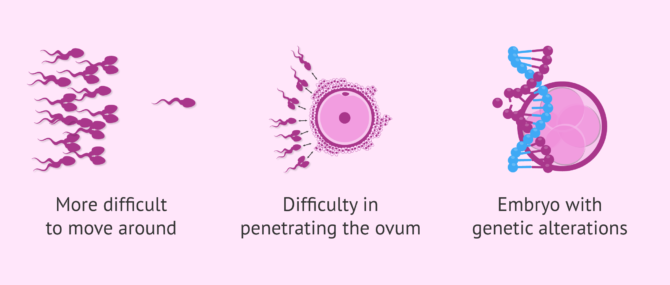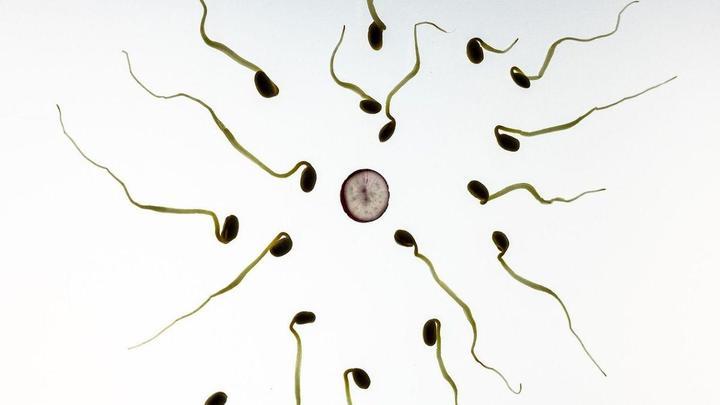The teratospermia (or teratozoospermia ) is a sperm abnormality characterized by sperm having morphologies defects. Due to these deformities, the fertilizing power of sperm is impaired, and the couple may have difficulty conceiving. However, Dawasanté experts provide you with a natural plant-based treatment to treat your teratospermia and allow you to conceive quickly.
Click HERE or on the image below to discover this natural treatment.

We deliver all over the world.
For more information, you can contact our experts on +229 51374202 direct line or by WhatsApp at the same number.
Obtaining a natural pregnancy with teratozoospermia can be complicated, and in the most severe cases it is virtually impossible for fertilization to take place and the embryo to develop afterward.
Men who are infertile with teratozoospermia will need to use assisted reproduction techniques to become parents.
The appropriate treatment for PMA will depend on many factors, not just the degree of sperm abnormalities. The rest of the seminal parameters, as well as the age and state of health of the woman, are also limiting when it comes to achieving pregnancy.
Below you will find an index with all the points that we will cover in this article.
1-Natural pregnancy
Amorphous sperm can make pregnancy difficult for any of the following reasons:
- They have more difficulty moving due to their abnormal shape, which prevents them from reaching the egg in the fallopian tube .
- Abnormalities in the head can prevent sperm from entering the egg so it can be fertilized.
- When the cause of teratozoospermia is genetic, the resulting embryo may have DNA alterations that prevent its correct development.
Infertility due to teratospermia

All these reasons make natural pregnancy not possible or its arrival is delayed.
When the degree of teratozoospermia is low, the normal sperm that exists in the semen could lead to a viable pregnancy. Depending on the parameters of sperm concentration and mobility, the probability of natural pregnancy with teratozoospermia will be higher or lower.
On the other hand, when teratozoospermia is moderate, severe or associated with another disorder ( oligozoospermia or asthenozoospermia ), the couple will most likely need ART treatment to have a child.
2-Medically assisted procreation treatments
Once the diagnosis of teratospermia has been obtained, depending on its severity and other values of the spermogram, the specialist will recommend the treatment that offers the best guarantees of success in the couple.
It should be noted that the reproductive status of women also plays an important role in this decision. When the male factor is the problem, there are several assisted reproduction techniques that can be performed depending on the characteristics of each patient.
2-1 Artificial insemination (AI)
The artificial insemination is the introduction of sperm directly into the uterus of a woman to get pregnant. Beforehand, it will be necessary to perform the capacitation of the sperm sample and to perform ovarian stimulation in the woman.
This assisted reproduction treatment can give good results in cases of mild teratozoospermia (3-4% of sperm are normal), provided that the number and mobility of sperm are affected.
To perform artificial insemination, a man must obtain a total of 2-3 million progressively motile sperm in the REM spermogram.
In addition, the woman must be under 35 - 36 years old, have leaky fallopian tubes and have no other serious infertility problem. If you want more information about this treatment, we recommend that you consult the following article: What is artificial insemination?
2-2 In vitro fertilization (IVF)
IVF is one of the most important treatments for assisted human reproduction. It consists of taking several mature eggs from the woman after ovarian stimulation and follicular puncture, then putting them in direct contact with male sperm and carrying out fertilization.
This method offers good results in cases of moderate teratozoospermia (1-2% of normal sperm) or mild teratozoospermia when the woman is over 35 years old. It would also be the treatment to try if, after several artificial inseminations, no pregnancy is obtained.
There is a variant of IVF in which fertilization is forced by the direct introduction of the sperm into the egg. This is called an intracytoplasmic sperm injection ( ICSI ).
ICSI is mainly used in cases of severe teratozoospermia (total normal sperm is less than 1%) or if the above techniques have not worked.
However, most IVF treatments today use ICSI as a technique for creating the embryos, as it offers a higher success rate than conventional IVF.
We recommend that you read the following article for more detailed information on this technique: What is ICSI and how much does it cost?
PMA, like any medical treatment, requires that you trust the professionalism of the doctors and clinic you have chosen. Obviously, not all are the same. The Fertility Report selects the most advantageous clinics for you based on our rigorous quality criteria. In addition, the system performs a comparison of prices and conditions offered by different clinics to facilitate your decision making.
2-3 IMSI
The IMSI is a variant of the ICSI technique that was discussed in the previous section. It is based on a more rigorous selection of the spermatozoa to be micro-injected according to their morphology.
To do this, we use an electron microscope with a superlens that offers a magnification of over 6,000 times.
This technique offers many advantages in the case of teratozoospermia because it allows us to visualize in detail the morphology of the spermatozoa and to choose the best ones.
Another benefit of IMSI is that it reduces the likelihood of miscarriage with its use.
The IMSI technique

If you want to know more about it, you can read the following article: What is IMSI?
3-Your frequently asked questions
3-1 Which assisted reproduction treatment is most appropriate for a pregnancy when the man has teratozoospermia?
By Zaira Salvador (embryologist).
The fertility treatment indicated for a couple with teratospermia will depend on various factors, such as the degree of teratozoospermia, the age of the woman, the time of infertility, etc.
The most appropriate, in general, would be to undergo in vitro fertilization (IVF) treatment with intracytoplasmic sperm injection (ICSI).
Read more
3-2 Can abnormal sperm cause miscarriages?
By Zaira Salvador (embryologist).
Having teratozoospermia does not imply that there is a greater risk of miscarriage when the pregnancy has already been achieved. However, if the cause of teratozoospermia is genetic and the sperm carry DNA mutations, a miscarriage or the birth of a sick child could occur.
3-3 Can teratozoospermia lead to pregnancy with Down syndrome?
By Zaira Salvador (embryologist).
Teratozoospermia is not directly related to trisomy 21, which is the chromosomal alteration that causes Down syndrome. However, sperm with abnormal morphology may have genetic abnormalities that cause fertilization failures, a greater likelihood of miscarriages, or other pathologies.
3-4 What is the appropriate treatment for a couple with teratozoospermia and PCOS?
By Zaira Salvador (embryologist).
Treatment will depend on the degree of teratozoospermia and the age of the woman. If the teratozoospermia is mild and the woman is under 35, it is possible to try artificial insemination. If the above requirements do not work or are not met, in vitro fertilization would be necessary.
It is estimated that 30 to 40% of fertility disorders are due to abnormalities in the fertility of the male partner. In men, infertility is related to the quality and number of sperm in semen.
Male fertility abnormalities
There are four types of sperm abnormalities, which can be associated in the same person.
What is azoospermia?
We speak of azoospermia when the semen does not contain sperm. This fertility disorder may be due to:
- absence or abnormality in the production of sperm (for example, in a man who has undergone cancer treatment with radiotherapy to the pelvis or chemotherapy, and whose cells that make sperm have been damaged by this treatment) ;
- blockage of the pathways used by sperm from the testes to the organs where sperm is stored (the seminal vesicles). Sometimes the transport channels are blocked and the sperm cannot travel to the seminal vesicles. These obstacles may be congenital or due to an ill-treated sexually transmitted infection.
What is oligospermia
We speak of oligospermia when the sperm contains too low a number of sperm. The causes of oligospermia are similar to those of azoospermia.
What is teratospermia?
The teratospermia is the presence of sperm "abnormal" in large numbers in semen. It is due to a manufacturing defect in the testicles. Malformed sperm have difficulty moving or fail to enter the oocyte.
What are the risk factors for male fertility disorders?
Some risk factors for infertility have been identified in humans:
- age (over 40);
- smoking or alcoholism ;
- factors that expose the testes to too high a temperature (too frequent hot tubs and baths, saunas and steam rooms, too much time spent driving, etc.): the production of sperm requires a temperature of the testes lower than that of the body (i.e. is for this reason that they are outside). Sometimes, the venous circulation is bad at the level of the testicles (it is the “varicocele”) and their temperature increases with a higher risk of infertility.
- toxic products used in certain professions;
- a medical history (especially cancer treatment or mumps).
We deliver all over the world.
For more information, you can contact our experts on +229 51374202 direct line or by WhatsApp at the same number.

